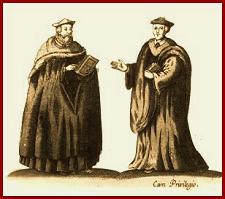A Classical Education
If you have a university education (or know someone who has), you should be at least slightly familiar with the following authorities and course of study, which has been in place since medieval times. Courses in beer and mayhem are supplementary.
In the Faculty of the Arts
-
The principal authority is always Aristotle on...
- Logical or Rational Philosophy:
Organon, Categories, On Interpretation, Analytics, etc.
Moral Philosophy: Ethics, Politics, Rhetoric, Poetics
Natural Philosophy, or Natural History: Physical Discourse, On the Heavens, On the Soul, On Parts of Animals, Meteorologics,, etc.
The Seven Liberal Arts
-
Grammar: Priscian, Donatus, Villedieu,
Cassiodorus, and some pagan and early Christian writers.
- Rhetoric: Quintillian, Cicero, Eberhard de Bethune
- Logic: Porphyry, Gilbert de la Porť, Hispanus
- Arithmetic: John of Holywood, John of Pisa
- Geometry: Euclid, BoŽthius
- Music: BoŽthius, Jehan de Muris of Paris (Ars novae musicae, 1319), Plato's Timaeus, Aristoxenos
- Astronomy:Gerard de Cremona
- Rhetoric: Quintillian, Cicero, Eberhard de Bethune
In the Faculty of Law
The principal Latin authorities are:- In civil law
-
Corpus Juris Civilis, the Code, the Pandects (a digest), the
Institutes, the Novellae
- In canon (church) law
-
Gratian, Bartholomew, Pope Gregory IX, Pope Boniface VIII,
Constitutiones Clementiae
In the Faculty of Theology
The Bible, Peter Lombard, Church Fathers, and great doctors of the church such as Origen, Augustine, and AquinasIn the Faculty of Medicine
Hippocrates, Galen, Arabic and Jewish medical texts, Theodore of Lucca, Lanfranci, ChauliacSome specialized authorities
Isidore of Seville: Etymologiae (On Language) and Sententiae (Maxims)Rabanus Maurus, On the Universe and On the Instruction of the Clergy
(Emperor) Frederick II, The Falcon Book
Gordanus Rufus, On Horse Healing
![]() What Every Schoolboy Knows
What Every Schoolboy Knows
![]() Classical References
Classical References
![]() Proverbs & Wise Sayings
Proverbs & Wise Sayings
![]() Children & Childhood
Children & Childhood





28 March 2008 mps
